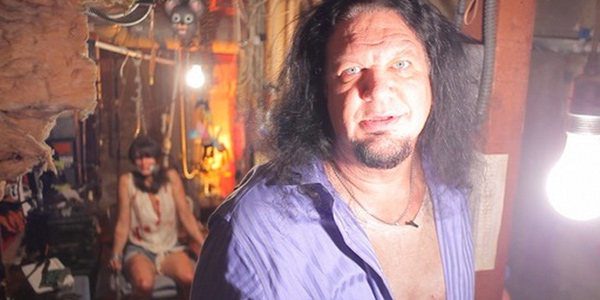Similar to the found footage subgenre, the self-referential meta angle in cinema has now been explored substantially and pretty much exhausted. Who would have thought then, that the person to rejuvenate things would be one half of celebrated magic duo, Penn & Teller.
Alongside co-creator and the film’s director Adam Rifkin, Penn Jillette has not only delivered a delicious and sharp Hollywood satire of the ‘purchase your own dream’ crowdfunding era, but also crafted an extremely humorous and inventive film, to boot. Directors Cut is a unique endeavour that it never outstays its welcome, despite the seemingly limiting storytelling device.
Essentially what you get here is two films for one. The first is a po-faced CSI-style police procedural where a chauvinistic detective duo begrudgingly take on a female colleague to help catch a serial killer replicating the work of famous murderers. On top of that (stay with me here) is a ‘director’s cut’ version, where Jillette’s character Herbert Blount, a disgruntled and overbearing financier of the fictional film, has essentially hijacked the director’s version (the filmmaker within the film is played by Rifkin as ‘himself’) and severely re-editing it to his own liking.
 Blout is first introduced via a special director’s commentary, complete with his faux naïve and faintly condescending voice-over (“this is called an establishing shot”) guiding the audience around the film and the film-making process. It soon transpires that he isn’t the wide-eyed innocent type, but a creepy and obsessive voyeur who is deeply infatuated with the film’s leading lady (the underrated Missi Pyle).
Blout is first introduced via a special director’s commentary, complete with his faux naïve and faintly condescending voice-over (“this is called an establishing shot”) guiding the audience around the film and the film-making process. It soon transpires that he isn’t the wide-eyed innocent type, but a creepy and obsessive voyeur who is deeply infatuated with the film’s leading lady (the underrated Missi Pyle).
Soon the film goes off on an entirely new and disturbing tangent, where Blout begins cutting in his own amateur camerawork and hidden GoPro footage (a chunk of it coming from various angles in Pyle’s hotel room). This is an attempt on his behalf to wrestle the storyline away from the love affair Pyle’s character begins with one of the detectives (played by Harry Hamblin).


Pyle is a great sport and taps into a side of her hitherto unseen on screen before now. We see her ‘real’ self via Blout’s roving camera, where suddenly the pleasant facade drops, revealing she’s another unpleasant and cynical actor going through the motions on screen. This often ingenious and constantly hilarious film does anything but that.









